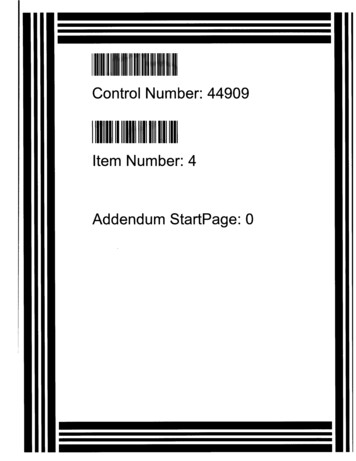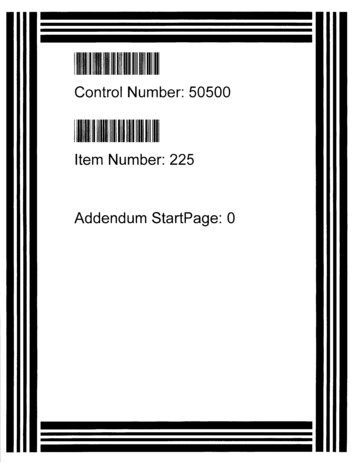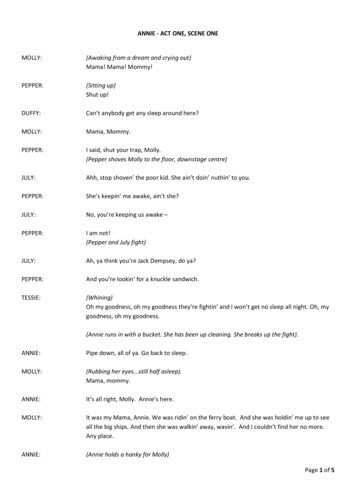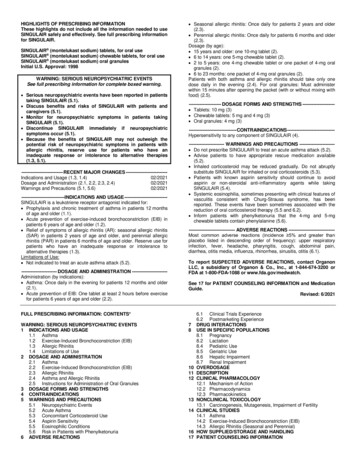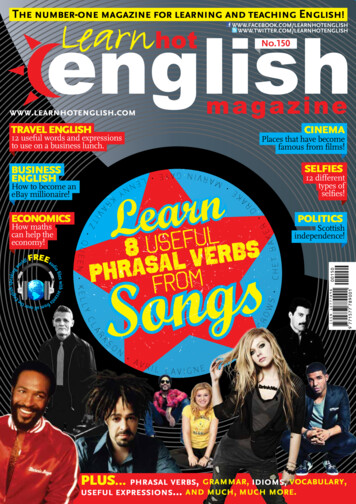
Transcription
The number-one magazine for learning and teaching Travel EnglishCinema12 useful words and expressionsto use on a business lunch. ntiu AoCvril Lavigne nPlus phrasal verbs, grammar, idioms, vocabulary,useful expressions and much, much more.9 771577 7890010015015777898s CrISSNChet endence!sgnoSall over thefromtsk9 771577 78900100150DKar15777898aClISSN ravitzfiles with accenyen KelldiooFREE aurld!12 differenttypes ofselfies!8 u verbslasaphr from QueHow mathscan help theeconomy!Selfieskenyenin Gaye LnraLesefulHow to become aneBay millionaire!EconomicsMarvBusinessEnglishPlaces that have becomefamous from films!
classlairT NLY!59.5 OLearnEnglish l!eriatam Learn Englishover thephone! with Hot English telephone classes!Native English teachers just a phone call away.Access to the very best materials through our Student’s Area.Structured classes with clear objectives per class/month/year.Very competitive prices from just 9 per class.Choose your timetable from 7am - 10pm (CET).But don’t take our word for it, try out a.and then choose one of the four courses from below.1 Improve yourspoken English2 Learnbusiness English3 Be successfulat job interviewsTRIAL LESSON4 Passyour exams(00 34) 91 455 0273telephone-englishclasses@learnhotenglish.com www.telephone-english.com
Editor’s introMagazine IndexHow you learn English with Learn Hot English magazineWhy are you learning English? To get a better job, to pass an official English exam,to travel, or just to communicate in English? Learn Hot English magazine helps with all this.1Increase your vocabulary. In every issue of Learn HotEnglish you’ll learn over 350 English words and expressions! Plusyou’ll learn lots of idioms, phrasal verbs, grammar and more.2Improve your listening. Every magazine has 60minutes of spoken English audio. You’ll learn to understandEnglish, plus you can hear lots of different accents!3English for exams! Learn Hot English helps prepareyou for official English exams (First Certificate, IELTS, TOEFL,etc.). How? Exams test your ability to speak and your rangeof vocabulary. Hot English improves your communicationskills and your knowledge of words and expressions.4English for work! Practical English for the office, formeetings, for talking to clients – it’s all in Hot English.Plus, read business tips from entrepreneurs.5English for life! Want to travel to English-speakingcountries? With Learn Hot English you’ll learn the wordsand expressions you need for international travel!6English for speaking! How do native Englishspeakers really talk? Learn with our natural Englishconversations. Also, learn English slang and read aboutcurrent events (news, culture, music, films) so you canmake conversation with native English speakers.7Want to learn even more? Get a Skills Booklet!You’ll learn extra vocabulary, grammar, social Englishand business English. The Skills Booklets are linkedto the topics in Hot English magazine. They’re soldseparately – see page 25 for more information.Hi, and welcome to another issueof Learn Hot English magazine – thepractical, informative and fun magazinefor learning English.In this month’s issue, we’re looking at 8songs with phrasal verbs in them. Listento the songs then read about the phrasalverbs in the songs. Songs are a greatway to learn English. You can learn lots of useful wordsand expressions. And if you sing along to the songs, you’llimprove your speaking and pronunciation skills, too.This month, we’re also looking at the online retailer eBay.Read about some unusual things that have been sold oneBay, find out how to become an eBay millionaire andget some top tips from the founder of the ecommerce giant.Of course, that’s not all. We’ve also got some articles onselfies, Ig Nobels (unusual science prizes), weddings, conartists, maths, gifts, Scotland, World War One and somevery unusual conspiracy theories. to mention just a few.Don’t forget to check out the blog on our website:blog.learnhotenglish.com for free lessons and articles on howto learn English. Or like us on Facebook or Twitter(@LearnHotEnglish) so you can keep up with our latest news.Yours,GLOSSARYan online retailer na website where you can buy things (andsometimes sell them too)the founder nthe person who “founds” (starts) a companyor businessecommerce nbuying and selling things online910111213EditorialVocabulary: BreakfastBreakfast Track 1Products Track 2Selfies Track 3Grammar Booster:Second Conditionals Track 4Word Booster: words &expressions with “give”English in Action.Shops Track 5Natural English: food Track 6Listening activity:The date Track 7Practical English:Networking Track 8The Chinese English AccentTrack 9Intermediate (CEF level: B1)715161718192021222123Remember to downloadthe Hot English app foriPad, iPhone, iPod Touch and Android. It’s fantastic!232426Films Track 10eBay products Track 11Ig Nobels Track 12Listening activity:The blind date Track 13Business English:eBay Track 14Weddings Track 15Music. in English: MotownTrack 16Travel English:The business lunch Track 17How to learn English grammar8 phrasal verbs from songsTrack 18Entrepreneur Corner: eBAYUpper Intermediate (CEF level: B2)27 Recipe: fried rice /Film Script: Black Swan28 Con artists Track 1929 Maths Track 2030 Gifts Track 2131 Vocabulary Clinic: “City” words& expressions32 Quirky News:Free hugs Track 2233 Directory34 Listening activity:Conference call I Track 2335 “Problem” idiomsAdvanced (CEF level: C1)Improve your English speaking skills! Sign up for aSpeaking Course with Learn Hot English. Trial class just 5.95! See page 2 of this issue for more details, or visitwww.learnhotenglish.com and click on the button for“Telephone & Skype classes”.Online and magazine advertisingFollow Hot English on dio filesDownload the MP3 audio files for this issue forFREE from our website: www.learnhotenglish.com/mp3sEnjoy the magazine, learnlots of English and see youall next time,Pre-Intermediate (CEF level: A2)24(00 34) 91 543 3573Follow Hot English on Twitterwww.twitter.com/LearnHotEnglishAll material in this publication is strictly copyright, and all rights are reserved. Reproduction without permission is prohibited. The views expressedin Learn Hot English magazine do not necessarily represent the views of Hot English Publishing SL. However, we do think that maths is useful,Motown is cool and the excessive use of selfies on social media is a possible sign of a narcissistic personality disorder.36 Group Talk: Regrets Track 2437 Slang Conversation:Politics Track 2538 Scotland Track 2639 World domination Track 2740 World War I Track 2841 Listening activity:Conference call II Track 2942 Phrasal Verb Themes: Accidents43 Subscriptions44 Answers45 Crossword46 Story Time Track 30For great private language classes, e-mail classes@learnhotenglish.com / www.learnhotenglish.com /3
Useful vocabularyLearn Hot EnglishBreakfastBlog!Free lessons to improveyour English, and articleson learning English!blog.learnhotenglish.comHere are some typical things to have for breakfast.YoghurtCheeseToastCroissantPancakes (made from milk, flour and eggs)Poached egg (cooked in water)Scrambled eggs (eggs that are beaten then cooked)Jam (made from fruit)Marmalade (made from citrus fruits: oranges, etc.)Orange juiceHamCold cuts / cold meats (pieces of cured meat)CerealMuffinCup of coffeePot of teaOats (a type of cereal – also oatmeal)Porridge (oats cooked with milk or water)Fried breadBaked beans (white beans in a tomato sauce)Black pudding (a sausage made from blood)Fried mushroomsBacon4/ www.learnhotenglish.com / For fantastic Skype/Telephone classes, e-mail business@learnhotenglish.comSausageFried tomatoesBrown sauce (a sweet and spicy sauce)Hash brown (small pieces of fried potato)Fried egg (an egg cooked in oil)
Objective To improve your reading and listening skills.Think about itWhat time do you have breakfast? What’s the best breakfast you’ve ever had? Have you ever had abreakfast in a foreign country? What did you have? What did you like about it?Track 1: englishmaN & EnglishwomanBreakfast is themost importantmeal of the day!Breakfast aroundthe world!by Christian OlijveWe asked severalpeople what theyhave for breakfastand what it’s typical to eat intheir countries. Here’s whatthey told us.Answers on page 441Pre-readingWhat do you have forbreakfast? What do peoplehave in your country? Make alist of all the things you eat orpeople generally eat or drink.2Reading IRead or listen to the article once.Which breakfast sounds themost delicious? Why? Whichone would you like to try?3Reading IIRead the article again. Thenwrite a name next to eachdescription of what the personhas for breakfast.1. A banana and a Greekyoghurt.2. Olives marinated inolive oil, garlic andlemon.3. Scrambled eggs,tomatoes and orangejuice.4. Scrambled eggs withtomatoes, tortillas and“frijol” beans.5. Porridge with soy milkand cinnamon.“A typical Greek breakfastwould be some cheese andblack olives marinated inolive oil, garlic and lemon.It’s a good start to the day,with a cup of black coffee ofcourse.” Zacharias, Greece“A typical breakfast inMexico is probably “huevosrancheros” (ranch-styleeggs) with fried eggs,tortillas, rice, beans andchilli sauce. I really like thiskind of breakfast but notevery morning. Normally,I have scrambled eggs withtomatoes, tortillas and frijolbeans.” Carolina, Mexico“Breakfast for me usuallyconsists of a bananaand a Greek yogurt, andsometimes I’ll add oatmeal,oh, and I can’t functionproperly without a cup ofcoffee. When I go to eatbreakfast in a restaurant,I usually have eggs, toastand bacon, which is moretypical.” Roberto, USA“I think most people fromSpain have coffee, cerealor toast, or some biscuitsor a muffin for breakfast,but I don’t really have a bigappetite in the morningbecause I have to get upreally early. So, I usuallyhave some orange juiceand cereal with milk. It’salso typical here to have“churros” (fried sticks ofdough).” Carmen, Spain“I’m from the Netherlandsand a typical breakfast here iswholemeal bread with butterand Gouda cheese witha glass of milk. However,I usually have porridgewith soy milk and somecinnamon. I also have somefruit. On special occasionswe have croissants with jam,eggs, orange juice and someyoghurt with fresh fruit.”Jochem, The Netherlands“A typical breakfast herewould be an Englishbreakfast, with sausages,hash browns, bacon,fried eggs and beans,but hardly anyone I knowhas that in the morning.I usually start the day withsome scrambled eggsand tomatoes and freshorange juice. We have a fullEnglish breakfast on specialoccasions, but we usuallygo out for it as it’s too muchhassle to make at home.”Cynthia, England“Here in South Africa mybreakfast mostly consistsof a cappuccino with someoats, scrambled eggs andrye toast with peanut butter.On special occasions, wehave our own version ofthe English breakfast withscrambled eggs, rye bread,beef sausages, mushroomsand tomatoes. We love a bigbreakfast!” Tom, South AfricaVideoWatch chef Gordon Ramsaycook a delicious breakfast.Search YouTube for “Ramsay’sUSA Breakfast”.GLOSSARYto marinate vbif you “marinate” meat (for example), youkeep it in a mixture of oil, vinegar, spices,herbs, etc. before cooking ittortilla na thin, flat piece of bread made from eggsand corn or flour“frijol” (beans) n Spanish /Mexicandried seeds from a bean plant that youcan cook and eatGreek yoghurt na type of yoghurt that is thick and creamy.It has no whey (the watery part) of sourmilkan appetite nif you have an “appetite”, you’re hungry“churros” n Spanish / Mexicana type of breakfast food that consists of astick of fried dough (see next entry)dough na type of food made from flour, water, fatand sugarGouda cheese na type of yellow cheese made from cow’smilk. It’s from the Netherlandssoy milk nmilk that is made by soaking dry soybeansand mixing them with watercinnamon na spice from the bark of a treea hassle nif something is a “hassle”, it’s difficult andinvolves problemscappuccino ncoffee with froth (milk with air) andpowdered chocolate on toprye na cereal grown in cold countries. Its grainscan be used to make flour or breadpeanut butter na brown paste made from peanuts.You can put it on breadFor company classes or private tuition, contact classes@learnhotenglish.com / www.learnhotenglish.com /5
Objective To improve your reading and listening skills.Think about itTrack 2: ENGLISHMAN & US MANGo away! I’msleeping.Have you bought anything new lately? What was it? What are some of your favourite devicesor gadgets? What do you use them for? Have you read about any new inventions? What were they?Exams This reading and listening activity will help prepare you for English exams such as KET and TOEFL.5 fun productsyou’ve got to get!Have you seen anyunusual productslately? The DailyMail recently featured aselection of imaginative newinventions. Here are a fewof them.Answers on page 441Pre-readingLook at the pictures of theproducts. What do you thinkthey can do? Why are theyspecial? What problems willthey solve? Make notes.2The Suitcase ScooterThe Suitcase Scooter isa suitcase that can beconverted into an electricscooter. It has a speed ofup to about 20 km/h, andit was designed by ChineseInventor He Liangcai. Thescooter includes a throttle,brakes, lights, a GPS, a hornand a theft alarm, and hasenough power to travel upto a distance of about 60kilometres.Reading IRead or listen to the articleonce to compare your ideasfrom the Pre-reading activity.3Reading IIRead the article again. Then,write the following abbreviatednames of the products nextto each statement: Scooter,Jacket, Boot, Pillow, Cup1. It only weighs about 300grams.2. It can travel at speeds ofup to 20 km/h.3. With this product, youwon’t spill your coffee.4. It was designed by aninventor from Japan.5. It can completely isolateyou from
of Learn Hot English magazine – the practical, informative and fun magazine for learning English. In this month’s issue, we’re looking at 8 songs with phrasal verbs in them. Listen to the songs then read about the phrasal verbs in the songs. Songs are a great and expressions. And if you sing along to the songs, you’ll improve your speaking and pronunciation skills, too. This month, we .


